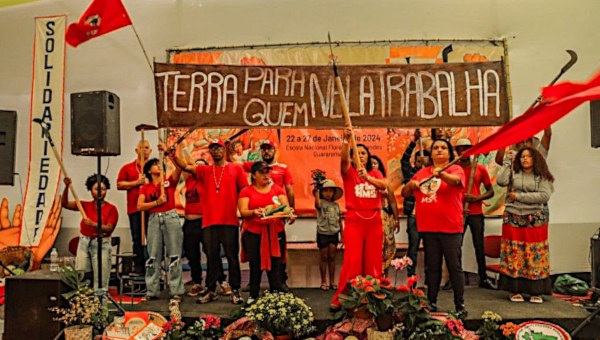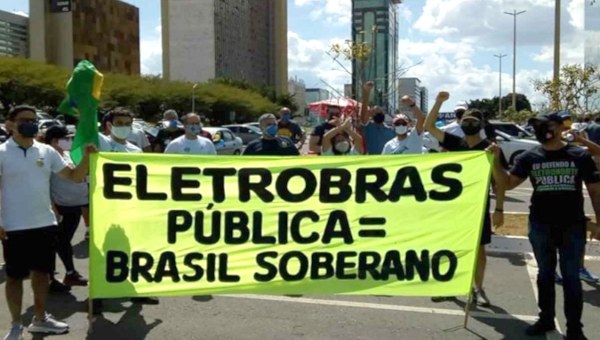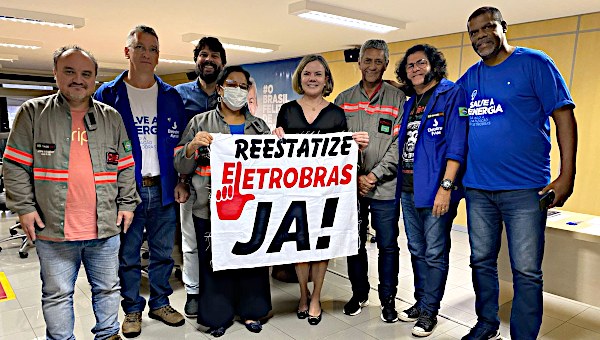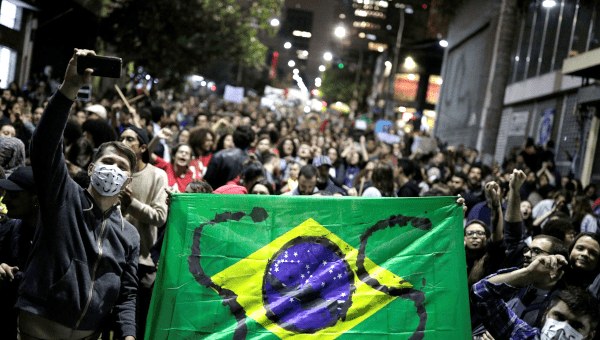There is no need to argue about the importance of Brazilian struggles and manifestations in recent days. They express an extraordinary willingness to change not only transportation, education and health policies, as some analysts have put it – reducing their significance – but to radically transform Brazilian society and its ways of exercising political power.
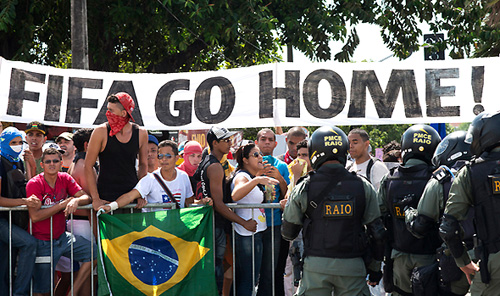
Those who have been monitoring or are directly involved in the efforts to organize daily popular struggles have known for a long time that fragmented and scattered protests, dissatisfaction and resistance movements have been multiplying in the social fabric. How many times have we seen each other in meetings and informal conversations analyzing or feeling sorry for the fragmentation, as well as trying to find political and organizational ways to facilitate convergence, unity, fronts and associations that could bring together thematic and localized conflicts? For how long have we found ourselves trying to overcome the difficulties of converging micro-localized struggles, different perspectives and diverse socially based experiences?
The arrogance and brutality of those in power did, in a few days, what many activists, grassroots organizations and social movements have tried to do for a good while: unify grievances, struggles, demands, and desires. It isn’t the first time this has happened in history. But what happened was beyond imagination essentially due to the impertinent superiority of the ruling political coalitions, as well as that present in the mega-events cartel, in the media, and in the big national corporations, speculators and corporate international interests articulated by the International Football Federation (FIFA) and International Olympic Committee (IOC). Their blindness, self-sufficiency and violence brought into the collective action sphere hundreds of thousands, even millions of young – and not so young – unhappy citizens who believed until yesterday that nothing could be done… but to accept the status quo reproduction.
A New Political Scenario
At first, conservative sociologists and political scientists, as well as political analysts regular in the media’s payroll, called to “explain the events” were rather skeptical and proudly proclaimed their final sentence: “rebels without a cause,” “hooligans.” They missed it all; as much as President Dilma Rousseff and [President of FIFA] Mr. Joseph Blatter missed it when booed at the Confederations Cup opening ceremony on June, 15th. She clearly showed her perplexity and he had a faded, frozen, smile on his face. They both had imagined they would be greeted for building, at a cost of more than $1-billion (U.S.), a soccer stadium for 70,000 people in a city where the average soccer audience is around 2,000 souls!
The perplexity, the misunderstandings, about the many and so diverse protests’ origins can only find one explanation: the social and political autism showed by those in power. In other words, the dominant not only spread their ideology, but they believe in it. The Globo Corporation[1] not only projects a fictional world through its messages but it is itself involved by the mystification it produces. As incredible as it may sound, the Globo Network believes in the Globo Network. Marketers believe in their political and social marketing and fail to connect themselves and understand the world as it escapes their image constructs and their mythologies.
All of them were quickly surpassed and had to recognize they stood before a large, powerful, deep and comprehensive political demonstration against the status quo. Unpartisan – for parties have been unable to channel and express the vitality and diversity of protests and claims – movements are far from representing a “non-political” or “unfocused” process. The focus was there to be seen by those capable of looking at the tree and comprehending the forest: transportation, health, education, corruption, democracy, public resources waste, political participation, human rights. Has any political party, in recent years, produced an agenda or schedule more precise and concrete? In a certain way, the high level of political awareness showed by the millions who were in the streets is surprising, albeit poorly organized.
These movements were not casual. They did not happen by chance. If the repressive violence flared them, it does not explain them. Mao Zedong, nowadays forgotten on the shelf, included in the Little Red Book collection (the bible of the Cultural Revolution’s first stage) a 1930 text entitled “A Single Spark Can Start a Prairie Fire.” This small sentence warns us about the mistakes of those who have tried, and are still trying, to reduce the movements into a bus fare or into a better public transportation struggle. This is one claim among many. If the Free Fare Movement took the initiative, the spark still cannot explain the fire, but the conditions in which it found the prairie. The prairie, as we now know, was dry, ready to burn. And the wind blew intensely to spread the fire.
In order to understand the movements it is necessary to consider, on the one hand, the multiplicity of fragmentary grievances and struggles that preceded them and that constituted their own foundation. On the other hand, one must understand a scenario marked by the sports mega-events cycle beginning. If the mega-events scenario, by itself, does not explain the social and political explosion, it would be hard to imagine such an explosion outside a context marked by the spree of public money, the surrender of our cities to the corporate world, and the developers and otherwise organized cartels that orbit around FIFA and the IOC.
Mega-events, mega-businesses, mega-protests. Another important aspect deserves to be mentioned here: in a number of cities, including those in which there will be no games in 2014 or 2016, there is a clear awareness of the meaning, direction, goals and results to expect from the mega-events. One can consider, indeed, that the World Cup and Olympics Popular Committees and their National Articulation (ANCOP) efforts throughout the last two years markedly contributed to build a collective consciousness, more widespread than it could be thought of; mega-events are now understood as unbearable burdens on our people, which divert priority resources to benefit the good old powerful partners.
In as much as the demonstrations have opened a new struggle scenario, have forcefully reconfigured new power correlations, and have opened-up grand new possibilities for advancing popular movements’ achievements, it is essential to have the entire spectrum clearly identified in order to establish next steps for the different movements and popular organizations.
Wavering in the Right and in Government:
Popular Movements’ New Advances
Since the first demonstrations, the complete inability to understand what was happening on the part of right-wing forces became clear, as it was shown by their usual driving force, the Globo Network – here representing the big media corporations and playing the role of a ‘ruling class central committee.’ After paying respect to the “firm police action against troublemakers” for a few days, the grand media started to set ‘legitimate claimers’ and ‘vandals’ apart. On Saturday, June 22nd, around two weeks after the movements had started, the main national broadcast, Globo’s Jornal Nacional, finally started to throw some light on the brutality of police repression and the provocative “official and orderly” actions.
Different political parties’ and government agents’ rhetoric started to line up, at different speeds, with a new tone, as millions of people gained the streets. Disoriented, not knowing what to do, mayors that had just denounced rioters and hoodlums, and had vowed the impossibility of reviewing bus fares, began to review the increases and the fares adopted before the movements. How could they now explain that fares which had to forcefully be raised could then be lowered? They did not explain a thing; they only evidenced their inconsistencies, disorientation and absolute lack of policies to face public transportation problems, a crucial problem of our cities.
The attempt to dampen the demonstrations with a few concessions could only have the opposite effect. People got the message: fighting and pressure lead to achievements that seemed impossible yesterday. “If you have any claims or protests, go to the streets and demonstrate them.” “We want this and we want more” answered the streets. More demonstrations, more people in each. And the prairie caught fire.
In the late 1970s and early 1980s, after the first strikes at ABC,[2] strikes hit the entire country: workers (re)discovered this form of struggle and its effectiveness. Something similar now happened: the people, and young people in particular, (re)discovered the potential and richness of public demonstrations and marches and gained the streets of Rio, São Paulo, of all capital cities, of small towns from north to south, east to west.
While national broadcasts focused on the alleged “vandals” and on violent episodes, protesters grew in number and grew apart from the bullies. All efforts to constrain demonstrations seemed then doomed to failure. Traditional techniques seemed to have lost efficacy: attempts to disqualify participants (‘rioters,’ ‘rebels without a cause’), granting the population some benefits (e.g. reducing bus fares), efforts to create terror (‘demonstrations always drift into violence’), nothing seemed to work.
This first stage seemed to end with a comprehensive victory of political struggles and demonstrations. President Rousseff’s address to the nation has perhaps signaled the beginning of a second stage.
President Dilma Rousseff’s Address to the Nation
President Dilma Rousseff’s address to the nation on Friday, June 21st, should be read and analyzed carefully. There are two hypotheses to explain its tone and meaning. The first hypothesis would be constructed in light of her first two years in office, filled with big corporation’s partnerships and their mega-projects. In fact, Dilma’s administration has honored so far the recent eight years of President Luiz Inácio Lula da Silva’s “governance pact” with the most reactionary forces in the country. This hypothesis would recommend taking the speech with caution and not very seriously. The power and favors granted to the interests represented by the triad Ricardo Teixeira – José Marin – Joseph Blatter[3] and the COB[4] – IOC structure would be sufficient to say there is nothing to expect from the current coalition government. Everything would only be a camera trick, a rhetoric operation seeking to appropriate the demonstrations’ freshness, creativeness and purposefulness. Summarizing, the speech would only be a revival of the traditional cooptation strategies, driven, as usual, by the most organized and negotiation based sectors.
The second hypothesis assumes there would be something new in the political context and that would be the basis for a new scenario. In this case, it is also possible to assume that, indeed, the President and the federal government hard core have listened and learned something with, as she put it, “the direct message from the streets.” There would have been a clash between different sectors of the governmental coalition and that would have resulted in a compass realignment toward a change, as timid as it might be, in dealing with the problems and movements that echoed in the streets. The sectors closer and more sensitive to the demonstrations would have conquered more space in the decision making processes.
In any circumstances, the President’s speech has to be read and analyzed with all attention, since it became evident that it was written carefully and precisely. Moreover, it was also addressed to the social movements’ organized sectors. Understanding what was said is essential if one wants to clearly define the next steps.
Let us start with the gaps and silences. First of all, there was a deafening silence about the police brutality. Abundant mentions of “vandalism” – echoing the Globo Network slogan – were made, but there was not a single reference to the open and brutal violations of the right to free manifestation enacted by the states’ police forces. While the very same administration discusses elsewhere the right to memory and truth regarding the military period (1964-1985), the legacy of the military dictatorship to democracy in Brazil becomes clearer than ever when police and special federal forces brutalize peaceful demonstrators. Was there any lack of information about police procedures during and after Rio de Janeiro’s demonstration on that June 20th evening? Unlikely. Most likely, a decision was made to overlook the extremely serious problem, which concerned the very democratic order foundations the presidential rhetoric seemed to stress and guard. The President’s silence is worrisome and must be clearly and openly questioned in the political arena.
The second problematic point of the speech relates to evading accountability over the use of public resources to build sumptuous and useless mega-events equipments and works. When the President said the federal budget was not used to finance such works she told the nation a half-truth, considering that: a) it is known that the Federal Treasury is the main guarantee of each and all mega-events projects; b) both the current and the past administrations have transferred Federal Treasury funds to BNDES,[5] which, in turn, finances and subsidizes the useless stadia costs, absurd road projects, hotels, etc.; c) the federal administration promoted tax exemptions in favor of FIFA’s and IOC’s associated companies; d) the federal administration also promoted exceptional legislation to authorize higher debt ceilings at state and municipal levels, openly violating the Fiscal Responsibility Act in order to allow surplus spending with mega-events. Furthermore, in keeping the focus at the federal budget alone the President sidestepped from the fact that states and municipalities incur higher debts, what actually represents now and will represent in the future the diversion of public funds (including federal transfers to states and to municipalities) for the benefit of enterprises far from the public interest.
A third issue draws attention in the official address: it was not made clear that responding to the streets “legitimate demands” will require transferring resources that are today, were yesterday and the day before directed to large corporations, through public-private partnerships or other types of friendly arrangements. In other words, in order to fulfill the commitments, governments will have to present the bill to those who have indulged themselves with public investments and subsidies. The proposed redefinition of priorities should penalize exactly those who have been privileged partners in the government coalition, i.e., big developers, speculators and contractors, whose names and addresses are well known: Odebrecht, Camargo Corrêa, OAS, Carioca Engenharia, Eike Batista, Carvalho Hosken, Andrade Gutierrez. These ‘stake-holders,’ among others pertaining to the privilege club, win every single bid for public-private partnerships and large investment projects, while they figure, together with big bankers, among the major donors to election campaigns. To what extent would the federal government be willing to penalize its private partners, who were until yesterday the main associates in the exercise of power and in the allocation of public resources?
Notwithstanding these silences and omissions, there are important statements that, if taken seriously, would represent an important advance in the position of a government that until yesterday showed itself little prone to really consider the demonstrations claims, in particular the claims by those impacted by FIFA World Cup’s and the Olympics’ projects. So President Dilma Rousseff said:
“Those who were on the streets yesterday gave a direct message to the whole society and especially the rulers of all instances. This direct message from the streets stands for more citizenship, for better schools, for better hospitals, health centers, and for the right to participation. This direct message from the streets shows a demand for high quality transportation at fair prices. This direct message from the streets stands for the right to influence in decisions at all government, legislature, and judicial levels.”[6]
It is important to notice that, unlike other politicians and analysts, the President recognizes that the demonstrations were not only about sectoral demands, material demands, but they also exposed a desire for “more citizenship” and to “influence in decisions.” Is it not a way to, indirectly but unequivocally, recognize that citizens’ rights and the democratic right to influence in public decisions have not been properly secured? Should it not be taken as self-criticism? In any event, it is a victory of all sectors and movements who have, in recent years, said and repeated this very argument, and have struggled to reverse the situation.
The president also stated that “the protesters’ agendas won national priority” and that “we must take advantage of the demonstrations strength to produce more changes, changes that benefit the entire Brazilian population.” Another self-criticism, as she recognizes that popular agendas have not been national priorities.
Well, if the first agent of the Republic addresses herself to the nation with such statements, and this is not a camera trick, it is up to all movements to demand that this new priority is established.
The President went further and announced:
“I will meet with the peaceful demonstration leaders, the youth organizations, unions, and labour movements’ representatives, the popular associations. We need their contributions, reflections and experiences, their energy and creativity, their faith in the future, and their ability to question past and present mistakes.”[7]
Another self-criticism, for announcing she will meet them is also a way to confess she did not meet them in the past and has not met them lately.
Finally, and even more important, the President solemnly declared: “It is citizenship and not economic power that should be heard first.” In a surprising and very important self-criticism, the President of the Republic informed, though subtly, that economic power has been heard in the first place. The commitment to change course is a promise to be accountable.
Even if it were mere camera trick, this address should be considered as one more sign of the movement’s strength, an unquestionable political victory. But it is also possible to assume that, to some extent, the President and the coalition government’s leading core have realized the embedded risks of departing so strikingly from people’s aspirations.
Next Steps
Essays like this, written in the heat of events, run the risk or may be doomed to become quickly anachronistic. But it is still easier to explain the past than to explore the future, especially when so many millions mobilize and, from one moment to another, burst on the public scene and new historical possibilities seem to be opened to the people. History does not follow a continuous pace or a linear path: it accelerates, it warps, it slows, it realigns. Lenin once said that “There are decades where nothing happens; and there are weeks when decades happen.” In these accelerated moments, when everything seems possible, those who seek social change are challenged to uncover and explore all possibilities.
The movements are on the offensive and are gaining ground. For how long? Hard to say. In any case, at the present moment and more than ever, it seems necessary to keep the initiative going, to move forward and to seize concrete achievements. It is necessary to take advantage of the defensive position in which rulers and dominant interests were placed. It is necessary to transform the streets’ cultural and political conquests in tangible achievements, materializing those platforms and claims elaborated and presented to governments in the past few years. After years of frustration, hopelessness and disillusionment, when, even among long-time militants, reigned a feeling that winning over conservative forces was no longer possible and that the only alternative was accommodation, new perspectives are now presented. Victories are possible, it is necessary to design and consolidate them.
In this direction, the commitments publicly made by the President must be seriously and consistently tested. If she said she will meet movements’ and organizations’ representatives, movements should immediately request to be received by the President in order to present their claims and demand concrete and immediate responses. The same should be done at sector and local levels. The current scenario must be taken advantage of. It is necessary that movements and organizations present their national agendas; and in every city, neighborhood, and workplace, they need to expose and require compliance to their local agendas.
The Juazeiro do Norte[8] experience offers a way to act at the local level.
“The movement embraced the teachers cause among other shortages in the municipality under the current mayor’s administration. Protesters organized themselves through social networks and gained the streets to protest against the mayor. The “Get Out, Raimundão” demonstration demanded the mayor’s resignation from the Juazeiro administration in Ceará. Along the same motto as the demonstrations’ that have taken place in various parts of Brazil, the population of Juazeiro, 493.4 km far from Fortaleza (state capital), took the streets on Tuesday, June the 18th, afternoon to protest against the city’s mayor, Raimundo Macedo (PMDB), criticized after sending a bill to City Council to reduce the public school teachers’ wages.”[9]
The permanent articulation among national and comprehensive agendas on the one hand, and the more concrete and immediately achievable local agendas, on the other hand, suggest we should continue fighting the general political fight as well as the more effective, local and short-term fights simultaneously. These immediate achievements are imperative to put the skepticism of many who do not believe in the possibility of real change, once and for all, away. In the current context, keeping bus fares at their original levels already demonstrated the importance of partial victories for the consolidation, expansion, and, above all, the growing politicization of the demonstrations.
In other historical moments, this articulation role used to be played by political parties engaged in social transformation. No political party seems to present the legitimacy and the political and organizational capacity to conduct such a process these days, that has both positive and negative aspects. The legitimacy, relevance and limits of partisan organizations however, will not be discussed here, for, besides being out of our focus, it represents a challenge to all countries in which significant sectors of society have questioned power and status quo, and not only to Brazil.
Those parties willing to understand that, despite being secondary players, they could bring an important contribution to the political articulation task, will not only fulfill an important role as may be qualifying themselves for new and more important functions. In that aim, however, it is necessary that parties have clear limits, abandoning all hegemonic dreams and placing themselves at the movements’ service.
Emerging movements, recent movements more or less organized, political parties, cultural groups of all kinds, this is how the crowds demanding change on the streets look like.
Ongoing processes indicate that it is time to tighten the siege around the public commitments made by the President and other leaders. President Rousseff stated that “it is citizenship and not economic power that should be heard first.” The President made the flag that has always been the social movements’ banner, her own flag. Welcome to join the movements that have always strived to make this banner a reality, Mrs. President. As a number of posters read in the demonstrations, “Sorry for the inconvenience, we are changing the country.” All of a sudden, this seems possible. We should not discard this possibility, which only arises a few times in a generation’s history. Another Brazil is possible, and it might be blooming. •


